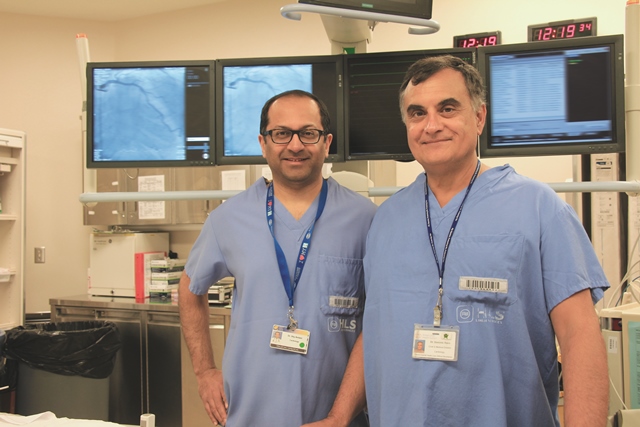
By Alineh Haidery
William Osler Health System (Osler) serves a growing and diverse community with one of the highest rates of heart disease in the country.
With its high patient volumes, Osler remains one of the province’s leading cardiac centres providing Percutaneous Coronary Intervention (PCI) treatment. Commonly known as coronary angioplasty, PCI is a non-surgical procedure that opens up blocked blood vessels. It is considered the ‘gold standard’ for individuals experiencing a heart attack due to blocked arteries, and is particularly important at Osler given that the communities the organization serves are at a greater risk of death from heart disease at younger ages than the average Canadian population.
Last quarter, Osler saw 75 patients experiencing heart attacks who required emergency angioplasties – the highest local volume of heart attacks for a single health centre in Ontario. Eighty-seven per cent of these patients (65 cases) were treated in less than 90 minutes – the benchmark mandated by Ontario’s Cardiac Care Network. The number of patients requiring angioplasty has grown significantly over the years. Currently, 2,000 angioplasties are performed each year at Osler, up from 1,200 performed just three years ago.
“We are serving a growing and diverse population that is at an increased risk for heart disease,” says Dr. Shy Amlani, Medical Director, Cardiac Procedures Unit at Osler. “Even with the increase in patient volumes, we have been able to maintain short timelines within which we provide care. These marked reductions in time for treatment are substantial and have the potential to cut mortality rates into half.”
Currently, Osler’s cardiac team performs these heart procedures at two catheterization laboratories at Brampton Civic Hospital. Patients from Osler’s other sites – Etobicoke General Hospital and Peel Memorial Centre for Integrated Health and Wellness – also receive care at Brampton Civic’s laboratories. In addition to the labs, Osler has 22 cardiologists working across its three sites, offering a comprehensive range of cardiac diagnostic services, and a pacemaker program to help patients restore normal heart rhythms and support better heart function.
So, how has Osler been able to do this? Dr. Dominic Raco, Corporate Chief and Medical Director of Cardiovascular Health System at Osler attributes it to “people power.” “We are very proud of the great strides the program has made. The level of care being provided has truly been a team effort and is a testament to Osler’s physicians and staff who are committed to providing the best care possible around the clock,” says Dr. Raco. “We work closely with the Emergency Department and EMS and are regularly streamlining processes to be able to provide timely and quality care, and better meet the needs of our patients.”
Alineh Haidery is the Regional Manager, Public Relations at William Osler Health System | Headwaters Health Care Centre | Central West CCAC.

